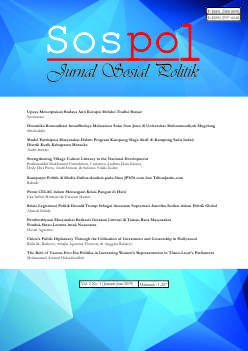China’s Public Diplomacy Through the Utilization of Investment and Censorship in Hollywood (2012 – 2016)
DOI:
https://doi.org/10.22219/sospol.v5i1.7765Keywords:
Bilateral Relation, China’s Public Diplomacy, Film Industry, Film Censorship, Multinational CorporationsAbstract
The conduct of traditional public diplomacy was merely concerned on the engagement of state actors. Not to mention, diplomatic communication is only occurred between the government officials by intention to earned political changes in targeted countries. Recently, public diplomacy is mainly focused on the positive reputation building in the other country and is conducted through political and economic cooperation among two countries or more, by involving the non-state actors also. Starting from its economic reforms initiative, China is engaged in international trade and successfully became one of global economic powers. By its rapid raise, China is feared to be a national threat to other countries, be it politically, economically, or even for the national security. Even more, the Western media often portrays China’s image in a negative light. Hence, in improving its global image, China expands its global outreach by establishing cooperation with the United States film industry, Hollywood, that strengthen by the 2012’s Memorandum of Understanding upon film industry, also by implementing Chinese censorship policy, where negative portrayals of China is prohibited. The conduct of censorship itself would be supervised under state-ruled agency, the SAPPRFT, and is supported by the involvement of Chinese multinational companies investors. Through this research study, the effort of China’s public diplomacy on the utilization of Hollywood as the United States film industry would be proven through new public diplomacy theory. Further, the role of multinational corporations will be assessed due to its essential contribution in enhancing Chinese censorship in Hollywood films for its global release.
Downloads
References
Books
d'Hooghe, I. (2010). The Expansion of China's Public Diplomacy System. In J. Wang, Soft Power in China: Public Diplomacy through Communication (pp. 19-35). New York: Palgrave Macmillan.
Melissen, J. (2005). The New Public Diplomacy: Between Theory and Practice. In J. Melissen, The New Public Diplomacy: Soft Power in International Relations (pp. 3-23). Basingstoke: Palgrave Macmillan.
Xiao, Z. (2013). Prohibition, Politics, and Nation-Building: A History of Film Censorship in China. In D. B. Winkel, Silencing Cinema: Film Censorship around the World (pp. 109-130). New York: Palgrave Macmillan.
Journal
Wang, Y. (2008). Public Diplomacy and the Rise of Chinese Soft Power. The Annals of American Academy, 257-273.
Government/Official Website
Library of Congress. (2017, February 28). China: First Law on Film Industry Effective in March. Retrieved from The Law Library of Congress: http://www.loc.gov/law/foreign-news/article/china-first-law-on-film-industry-effective-in-march/
World Bank. (2018, September 16). Where We Work: The World Bank In China. Retrieved from Overview: http://www.worldbank.org/en/country/china/overview
Online Article
Baldwin, C., & Cooke, K. (2015, July 24). How Sony sanitized the new Adam Sandler movie to please Chinese censors. Retrieved from Reuters: https://www.reuters.com/investigates/special-report/china-film/
Barnes, B. (2017, April 28). Christopher Dodd to Step Down as Top Lobbyist for Movie Industry. Retrieved from New York Times: https://www.nytimes.com/2017/04/28/business/media/chris-dodd-resign-mpaa.html
Cull, N. J. (2006, April 18). "Public Diplomacy" Before Gullion: The Evolution of a Phrase. Retrieved from USC Center on Public Diplomacy: https://www.uscpublicdiplomacy.org/blog/public-diplomacy-gullion-evolution-phrase
Frater, P. (2015, February 3). China Rising: How Four Giants Are Revolutionizing the Film Industry. Retrieved from Variety: https://variety.com/2015/film/asia/china-rising-quartet-of-middle-kingdom-conglomerates-revolutionizing-chinese-film-industry-1201421685/
Kirk, A. (2017, November 28). Mapped: Protectionism is on the rise as US and EU implement thousands of restrictive trade measures . Retrieved from The Telegraph: https://www.telegraph.co.uk/business/2017/11/28/mapped-protectionism-rise-us-eu-implement-thousands-restrictive/
Landreth, J. (2010, June 1). Chinese press rails against 'Red Dawn'. Retrieved from The Hollywood Reporter: https://www.hollywoodreporter.com/news/chinese-press-rails-red-dawn-24152
Lang, B., & Maddaus, G. (2016, September 22). Lawmakers Raise Questions About Chinese Investment in Hollywood. Retrieved from Variety: https://variety.com/2016/film/news/wanda-lawmakers-raise-questions-about-chinese-investment-in-hollywood-1201868250/
Liu, L. (2016, October 19). Washington is taking a hard look at China’s aggressive investment into US entertainment. Retrieved from Business Insider : https://www.businessinsider.sg/washington-takes-hard-look-at-chinas-investment-into-us-entertainment-2016-10/?r=US&IR=T
Marette, S., & Beghin, J. C. (2007). Are Standards Always Protectionist? Iowa: Center for Agricultural and Rural Development Iowa State University.
South China Morning Post. (2018, April 5). Hollywood says China will soon be world’s top film market, as ticket sales overtake US-Canada in 2018. Retrieved from South China Morning Post: https://www.scmp.com/culture/film-tv/article/2140381/china-will-soon-be-worlds-top-film-market-having-overtaken-us-canada
WikiLeaks. (2013, December 18). Sony - Re: Pixels China. Retrieved from WikiLeaks: https://wikileaks.org/sony/emails/emailid/189623
Downloads
Published
How to Cite
Issue
Section
License
Authors who publish with this journal agree to the following terms:
- Authors retain copyright and grant the journal right of first publication with the work simultaneously licensed under a Creative Commons Attribution-ShareAlike 4.0 International License that allows others to share the work with an acknowledgement of the work's authorship and initial publication in this journal.
- Authors are able to enter into separate, additional contractual arrangements for the non-exclusive distribution of the journal's published version of the work (e.g., post it to an institutional repository or publish it in a book), with an acknowledgement of its initial publication in this journal.
- Authors are permitted and encouraged to post their work online (e.g., in institutional repositories or on their website) prior to and during the submission process, as it can lead to productive exchanges, as well as earlier and greater citation of published work (See The Effect of Open Access).

This work is licensed under a Creative Commons Attribution-ShareAlike 4.0 International License.



















